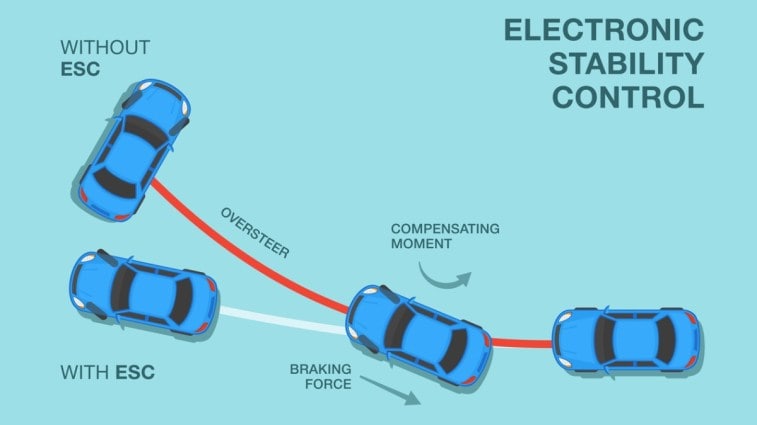Electronic Stability Control
https://www.kbb.com/car-advice/electronic-stability-control/
Everything You Need To Know

Quick Facts About Electronic Stability Control
- Electronic stability control systems help prevent cars from skidding when turning and drivers from losing control in critical driving situations.
- An ESC system evaluates data from various sensors and activates when it detects a loss of control, and then makes throttle and brake adjustments to bring the car back onto its path.
- A malfunctioning ESC system triggers a dashboard warning light. Take the car in for servicing if the light stays on.
Electronic stability control, or ESC, is an automatic system in your car designed to help keep you on course when steering. Continue reading to learn about ESC and how this automotive safety feature works to prevent accidents by helping your vehicle go in the direction you want it to go.
- What Is Electronic Stability Control?
- When Is Electronic Stability Control Activated?
- How Does Electronic Stability Control Work?
- How to Operate Electronic Stability Control
- Common Problems With Electronic Stability Control
- Benefits of Electronic Stability Control
- What the Electronic Stability Control Light Means
What Is Electronic Stability Control?
diagnose and service electronic stability control system issues. Estimating a price to correct problems here is difficult because of many variables. For example, the cost to replace a wheel speed sensor might cost $100 for one vehicle but $150 for another car. Depending on the vehicle, a replacement steering angle sensor can cost between $100 and $200 or more. On occasion, a software reset or update might fix a problem with your ESC. Labor rates can also vary by vehicle make and model, as well as your region.
Benefits of Electronic Stability Control
ESC systems use steering wheel position sensors to compare the wheel’s position to the vehicle’s actual steering response. If it detects something isn’t quite right, the ESC makes minor adjustments to the brakes or engine torque to help a driver maintain control.
An automobile’s ESC system provides many benefits:
- Counteracts vehicle skidding in slippery conditions
- Helps provide corrective support in critical driving situations
- Provides valuable assistive functions for driving safety, comfort, and agility
- Helps the driver maintain control of the car overall
MORE: Car Safety Features 101: Everything You Need to Know
What the Electronic Stability Control Light Means
Your car’s electronic stability control is a valuable safety feature. A malfunctioning ESC will stop working until any issues are fixed. An ESC indicator light illuminated on the vehicle’s dashboard can mean one of several things:
- Out of control. Electronic stability control is active and operating to maintain traction and direction because it senses the vehicle is not under control.
- Malfunction. The ESC system is malfunctioning or has been deactivated. You should promptly take the car to a qualified mechanic to correct the problem.
- Slippery conditions. An ESC dashboard light may indicate that driving conditions are slippery. You should slow down to improve your control.
Is It Safe to Drive With the ESC Light On?
You can drive your car if its electronic stability control light is showing on the dashboard but do so with extra caution. A steady ESC light may signal that the safety feature is malfunctioning.
Therefore, you must remember that you’re driving without the benefits of electronic stability control and have a greater risk of oversteering or understeering and spinning out of control. Reduce your speed, avoid hard braking, and keep off the road if it’s wet. We recommend you visit a qualified mechanic at a repair shop near you to fix the problem as soon as possible.
Things to Keep in Mind
- When the ESC light is off, your system is in ready mode.
- There is a direct relationship between your car’s ESC and its anti-lock braking system (ABS) and traction control system (TCS).
- The ESC system is most effective when the vehicle’s tires are properly inflated.
- Electronic stability control is standard equipment on newer cars. It became mandatory on all passenger vehicles starting with model year 2012. Some older vehicles, particularly premium brands, may have ESC included as an optional feature.
Read Related Articles on Car Safety:
- How Does Forward Collision Warning Work?
- Self-Driving Cars: Everything You Need to Know
- Do My Tires Need to be Replaced?
Editor’s Note: This article has been updated since its initial publication.


Comments
Post a Comment